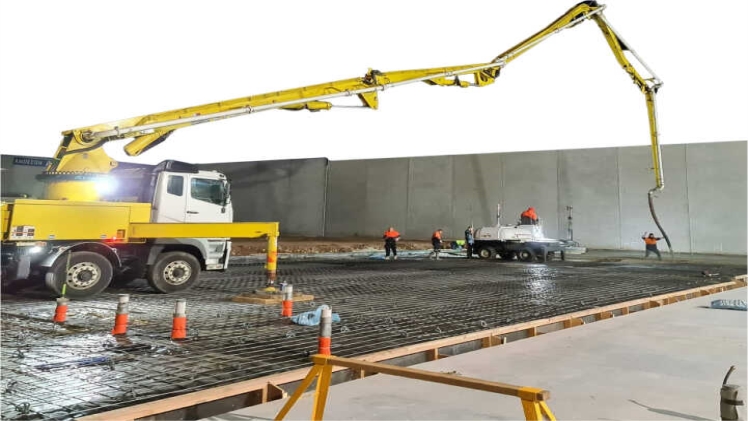Concrete pumps are great for projects that require a large volume of concrete. They save time and labour by pumping concrete to precise locations without the need for wheelbarrows.
Concrete pumps work by mixing and churning the concrete inside a rotating drum within the truck mixer. They then suck the concrete into a pipe with a hydraulic twin-cylindrical system that facilitates back and forth movement.
What is a concrete pump?
Concrete pumps are large machines that convey fresh concrete from the truck to the area where it needs to be placed. The basic pump operates using two hydraulic cylinders that work in inverse directions so that one cylinder draws the concrete mix from the hopper while the other pushes it into the discharge pipe. A synchronized valve controls which cylinder is open to the hopper and which is opened to the discharge pipe.
There are different types of concrete pumps available depending on your needs. These include boom pumps and line pumps. Boom pumps are used when the site requires a high volume placement and can reach locations that a standard mixer truck cannot. These pumps can be a great solution for construction sites with difficult to access areas such as basements and multi-level parking structures. They can also help to reduce labour costs by increasing the speed and accuracy of concrete placing. This can free up time and energy to focus on other important aspects of the project.
Line pumps
Rather than pumping concrete directly from the truck into a hole, line pumps use a series of pipes that run flat on the ground to direct concrete where it is needed. They are ideal for small, domestic projects like garden paths or patios.
These pumps use twin cylinder hydraulic pumps to draw concrete from the truck mixer into the pipeline, which they then pump at high pressure onto your site. Concrete is pumped at a constant rate, meaning that it arrives on site quickly and with a high-quality finish.
You will need a concrete pump if you have a project that requires concrete to be poured underground, up high or within a building that restricts access for a concrete mixer lorry. A boom or line concrete pump can help in these circumstances, but you’ll still need to get the lorry and equipment to the site and lay down pipes so that the concrete can be pumped through them.
Boom pumps
For concrete pours in areas that a ground line pump wouldn’t reach, a boom pump is the way to go. Essentially, these pumps have a hydraulic arm that can reach up to and over obstacles like houses or bridges. These are ideal for commercial construction projects or even just domestic concreting jobs.
Using a concrete pump to get the job done reduces the amount of time you’ll have to spend moving the materials around site. Unlike when transporting concrete by wheelbarrow, this method is far more efficient and eliminates the risk of spillage that can cause unnecessary waste.
By reducing the amount of people you need to transport concrete around the site, it’s easier for your team to focus on other aspects of the project. This can also free up labour for other activities, reducing your overall hiring costs.
How much does it cost to hire a concrete pump?
Concrete pumping is an efficient, cost-saving solution for construction projects that require concrete to be poured in difficult-to-reach areas. These machines offer time, labour and money savings over using a wheelbarrow, especially when tackling larger concrete pours such as basements or car parks.
There are two types of concrete pumps: boom concrete pumps and line concrete pumps. Boom concrete pumps are mounted on trucks and can be operated by remote control. These are commonly used on large construction sites and can pump concrete over long distances.
For smaller concrete jobs, trailer-mounted or line concrete pumps can be hired. These can be hired by the day and are generally cheaper than truck-mounted pumps. However, it is important to factor in any extra hire charges such as slurry costs, travel and pipe extension when calculating your cost. This is to ensure you are fully aware of the exact hire rate before hiring a concrete pump.

